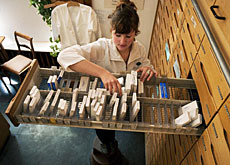Complaints about prices continue to rise

The year 2005 was a record year for Switzerland's price watchdog, with almost 1,400 complaints coming in from the general public.
The figure is almost 50 per cent up on 2004 and double that of 2003.
Moans mainly centred on prices for medicines, books, cable television and customs’ duties.
The federal price administrator, Rudolf Strahm, said the number of complaints represented growing public awareness of prices.
Medicines came under scrutiny once again, despite an agreement reached last September between the federal authorities and the pharmaceutical industry to cut prices by at least SFr250 million ($198.9 million) a year.
“It is not enough but it is already a step,” commented Strahm at a news conference in Bern on Friday.
He said that the government’s decision to increase the price for a branded drug if a generic is turned down should improve people’s awareness of cheaper alternatives.
Increase pressure
Strahm added at the same time it was important to increase pressure on doctors but that needed a revision of the law in a country he described as the “island of high cost”.
For Strahm, it was “intolerable” for the pharmaceutical industry to demand higher prices for new drugs in Switzerland, for example Tamiflu, than in the rest of Europe.
Other issues he brought up were easier market access for drugs whose patents had expired and the system of payments made to pharmacists.
The price administrator also called on Swissmedic – the Swiss Agency for Therapeutic Products – to continue its efforts to curb the explosion of regulations and taxes.
The development had created hindrances to business and competition which contributed to the spiralling of prices.
Parallel imports
Strahm also pointed out that parallel imports had only been authorised in four cases in four years.
Another issue that came to the fore in 2005 were so-called “administered prices”, in other words payments demanded by the state. These created distortions, Strahm said.
He noted that there would be more attention from his office to problems regularly pointed out by the public.
These included looking at the price of the new biometric passport, which will cost SFr250 ($190) instead of SFr120 for the current document and customs’ duties on small parcels.
Strahm will also examine electricity prices in Switzerland this year and lawyers’ fees.
swissinfo with agencies
The post of federal price administrator stems from the law on price surveillance. The legislation came about as a result of a popular initiative adopted in 1982.
The administrator looks at the level of prices of goods and services fixed by cartels and companies.
There is abuse when prices are not determined by proper competition.
Strahm can make recommendations to the authorities. As far as companies are concerned, if he cannot find an amicable solution, he can forbid all or a part of a rise or decrease in price levels.
The sectors that have come under most scrutiny in recent years have been telecommunications, electricity and health.
Despite surveillance, prices are between 25% and 40% higher in Switzerland than in neighbouring countries.

In compliance with the JTI standards
More: SWI swissinfo.ch certified by the Journalism Trust Initiative
You can find an overview of ongoing debates with our journalists here. Please join us!
If you want to start a conversation about a topic raised in this article or want to report factual errors, email us at english@swissinfo.ch.